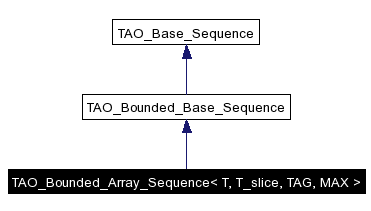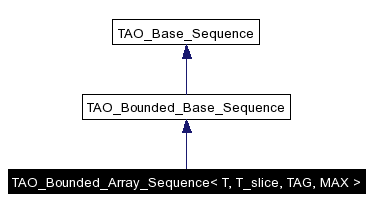
#include <Sequence_T.h>
Inheritance diagram for TAO_Bounded_Array_Sequence< T, T_slice, TAG, MAX >:


Public Member Functions | |
| TAO_Bounded_Array_Sequence (void) | |
| default ctor. | |
| TAO_Bounded_Array_Sequence (CORBA::ULong length, T *value, CORBA::Boolean release=0) | |
| Constructor from data. | |
| TAO_Bounded_Array_Sequence (const TAO_Bounded_Array_Sequence< T, T_slice, TAG, MAX > &) | |
| Copy constructor. | |
| ~TAO_Bounded_Array_Sequence (void) | |
| destructor | |
| TAO_Bounded_Array_Sequence & | operator= (const TAO_Bounded_Array_Sequence< T, T_slice, TAG, MAX > &) |
| Assignment from another Bounded sequence. | |
| T & | operator[] (CORBA::ULong) |
| operator [] | |
| const T & | operator[] (CORBA::ULong) const |
| operator [] | |
| virtual void | _allocate_buffer (CORBA::ULong length) |
| virtual void | _deallocate_buffer (void) |
| deallocate the buffer | |
| T * | get_buffer (CORBA::Boolean orphan=0) |
| const T * | get_buffer (void) const |
| void | replace (CORBA::ULong max, CORBA::ULong length, T *data, CORBA::Boolean release=0) |
Static Public Member Functions | |
| T * | allocbuf (CORBA::ULong length) |
| Allocate storage for a sequence.. | |
| void | freebuf (T *buffer) |
Please see the documentation for the unbounded case.
|
||||||||||
|
default ctor.
|
|
||||||||||||||||||||
|
Constructor from data.
|
|
||||||||||
|
Copy constructor.
|
|
||||||||||
|
destructor
|
|
||||||||||
|
allocate a buffer of the requested length. The buffer is allocated for the right type Implements TAO_Base_Sequence. |
|
||||||||||
|
deallocate the buffer
Implements TAO_Base_Sequence. |
|
||||||||||
|
Allocate storage for a sequence..
|
|
||||||||||
|
Free a buffer allocated by allocbuf() and release each element on it. |
|
||||||||||
|
This function allows read-only access to the sequence buffer. The sequence returns its buffer, allocating one of one has not yet been allocated. No direct modification of the returned buffer by the caller is permitted. |
|
||||||||||
|
Allows read-write access to the underlying buffer. If <orphan> is FALSE the sequence returns a pointer to its buffer, allocating one if it has not yet done so. The number of elements in the buffer can be determined from the sequence <length> accessor. If the <orphan> argument to <get_buffer> is FALSE, the sequence maintains ownership of the underlying buffer. Elements in the returned buffer may be directly replaced by the caller. If the <orphan> argument to <get_buffer> is TRUE, the sequence yields ownership of the buffer to the caller. If <orphan> is TRUE and the sequence does not own its buffer (i.e., its <release> flag is FALSE), the return value is a null pointer. If the buffer is taken from the sequence using this form of <get_buffer>, the sequence reverts to the same state it would have if constructed using its default constructor. The caller becomes responsible for eventually freeing each element of the returned buffer (for strings, wide string, and object references), and then freeing the returned buffer itself using <freebuf>. |
|
||||||||||
|
Assignment from another Bounded sequence.
|
|
||||||||||
|
operator []
|
|
||||||||||
|
operator []
|
|
||||||||||||||||||||||||
|
Allows the buffer underlying a sequence to be replaced. The parameters to <replace> are identical in type, order, and purpose to those for the <T *data> constructor for the sequence. |
 1.3.9.1
1.3.9.1